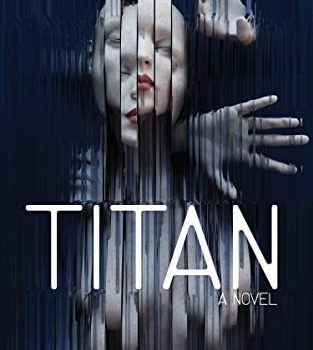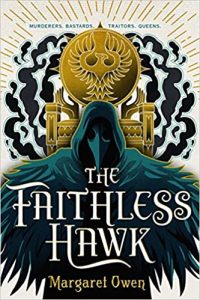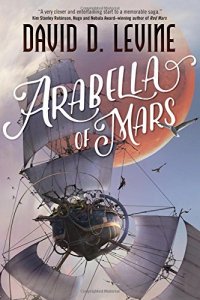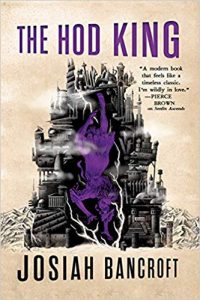Jake Casella Brookins Reviews Titan by Mado Nozaki
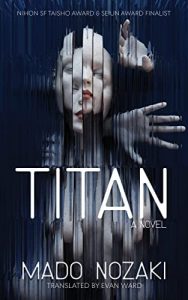 Titan, Mado Nozaki (Airship 978-1-68579-318-0, $14.99, 496pp, tp) October 2022.
Titan, Mado Nozaki (Airship 978-1-68579-318-0, $14.99, 496pp, tp) October 2022.
In Mado Nozaki’s Titan (translated by Evan Ward), humans of the 23rd century have it pretty easy – a life of fully automated luxury, all facilitated by omnipresent, omnibenevolent AI. All of that is threatened when one node of the Titan network – Coeus – begins to suffer mysterious problems, and Seika Naisho, an average citizen who studies psychology as a hobby, finds herself inducted into the rarest of circles – the employed. Joining a strange small cast of other workers, Seika is tasked with counseling Coeus as his personality forms, in the hope of finding a solution to his malaise before it undermines the world’s utopian systems. Together, they must navigate the internal and external world, as both of them ponder the question and problem of work.
Titan is obviously deeply steeped in various traditions of AI and robots, but it’s Hideaki Anno’s Neon Genesis: Evangelion that I was most often reminded of, conceptually if not tonally – menacing Abrahamic symbols replaced with a cold but caring version of the Greek Titans, towering and intermittently organic mecha, and a long and measured interest in identity and personality. Stanislaw Lem’s Solaris also feels like a touchstone – particularly during Coeus’s amorphous formation – but instead of feeling maddened by their frequent isolation, both Seika and Coeus seem to enjoy the quiet. And, in its fairly simplistic utopia – facilitated by Titan’s helpful robotic “phalanges,” constant background monitoring and assistance, and an array of automated vehicles – it resembles nothing quite so much as an IT-updated episode of The Jetsons. Though, granted, the robots don’t talk back (at first), and there’s no need to do any work even so onerous as pushing a button.
A number of elements feel strangely – though perhaps not unintentionally – out of date. Most striking of these is the absence of climate change, especially considering the way Nozaki’s 12.5 billion humans and their robotic servants/overlords pursue lives of decadent consumption. The strange prominence of Freud and Jung and a distinctive (and erroneously hierarchical) fixation on evolution combine to give Titan something of the flavor of science fiction from the 1940s or ’50s. Obviously in the lineage of works like Asimov’s I, Robot and Clarke’s Childhood’s End, most of the novel’s anachronisms, blindspots, and expositional indulgences ultimately feel of a piece with its overall style; its casual framing of sexual harassment (and Seika being blackmailed to work with false rape charges) is much harder to overlook.
Despite these sticking points, the novel’s virtue is ultimately in its fundamental lightness. Yes, it’s probing big questions about human society and intelligence, and, yes, it does feature tense chase scenes and skyscraper-sized mecha fights. The heart of the novel, though, is essentially quiet, contemplative, and even soft, with long sequences of Seika and Coeus musing about the nature of personal identity and work, observing the landscape, and learning to cook for each other as an exercise in humanity. Occasional big set-pieces aside, Titan reminded me far more of Chambers’s A Psalm for the Wild-Built than anything else I’ve read recently, and it’s worth mentioning that this book’s Japanese publishing category – the “light novel” – is something of a parallel to both modern YA and earlier pulp-descended novels. Nozaki is an acclaimed writer of anime and manga as well as light novels (Hello World, Babylon), and Titan is suffused with the kind of quiet, conversational, and philosophical moments that often characterize those genres.
Unfortunately, for me, that lightness is a distractingly insufficient attitude to apply to the novel’s explicitly-framed central questions about the nature of work. Seika and Coeus’s attempts to figure out what work “is” through armchair discussions of concepts as disparate as artistic creation and the physics of heat is strangely limited at best; the absence of any kind of socioeconomic consideration is impossible to overlook. It’s telling that Coeus, who contains the sum total of human knowledge, has seemingly never come across the labor theory of value in all his cybernetic soul-searching. Titan’s post-scarcity world, too my thinking, is too blinkered by capitalist-consumerist ideology to answer or even seriously ponder the questions it frames as central. Which is a real shame, as there’s a rich tradition exploring these themes and imagining alternatives to our current system is some of the most vital work – there’s that word again – that science fiction can undertake.
Jake Casella Brookins is from the Pennsylvania Appalachians, and spent a fantastic amount of time in the woods. He studied biology, before switching over to philosophy & literature, at Mansfield University. He’s been a specialty coffee professional since 2006. He’s worn a lot of coffee hats. He worked in Upstate New York and Ontario for about 8 years. He’s been in Chicago since 2013; prior to the pandemic, he worked for Intelligentsia Coffee in the Loop. Starting in 2021, he’s been selling books at a local indie bookstore. He lives with his wife, Alison, and their dogs Tiptree & Jo, in Logan Square.
This review and more like it in the November 2022 issue of Locus.
 While you are here, please take a moment to support Locus with a one-time or recurring donation. We rely on reader donations to keep the magazine and site going, and would like to keep the site paywall free, but WE NEED YOUR FINANCIAL SUPPORT to continue quality coverage of the science fiction and fantasy field.
While you are here, please take a moment to support Locus with a one-time or recurring donation. We rely on reader donations to keep the magazine and site going, and would like to keep the site paywall free, but WE NEED YOUR FINANCIAL SUPPORT to continue quality coverage of the science fiction and fantasy field.
©Locus Magazine. Copyrighted material may not be republished without permission of LSFF.


